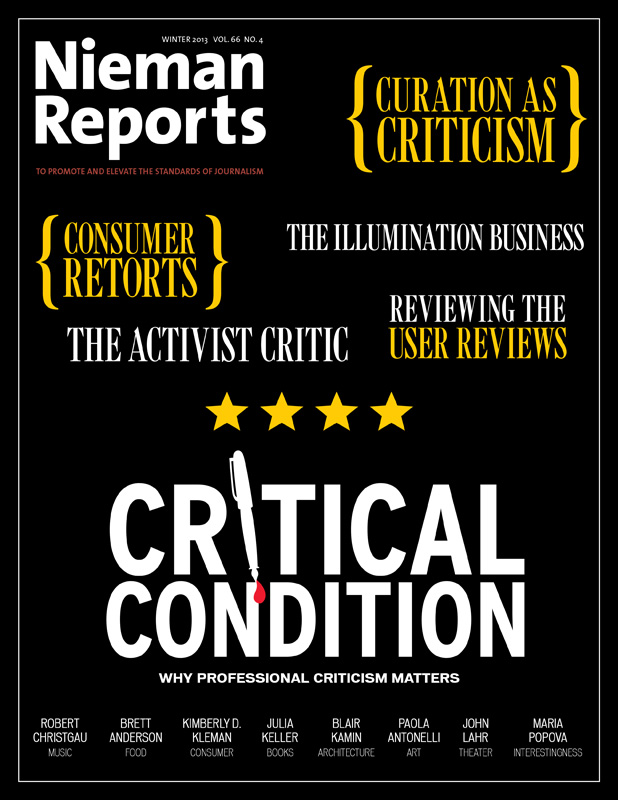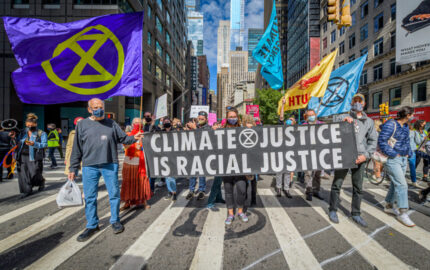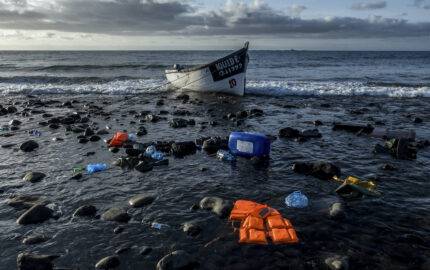
Critical Condition
“If you are counting full-time critic jobs at newspapers, you may as well count tombstones.” That was the response of Johanna Keller, director of the Goldring Arts Journalism Program at Syracuse University's S.I. Newhouse School of Public Communications, to a Nieman Reports query about the number of professional critics employed at dailies around the country. The figures on newspaper critics (News flash: they're not good) are one indication of the state of criticism today, but they are not the only one.
For more than 30 years, author Barbara Ehrenreich has been trying to engage and enrage the public about the devastating impact of poverty in the United States. She’s had some success—2001’s “Nickel and Dimed: On (Not) Getting By in America,” her chronicle of surviving as a minimum-wage worker for three months, was a bestseller and became a manifesto for the living wage movement—but not enough. Now, although she isn’t giving up, she is changing tactics.
RELATED ARTICLE
“It Can't Happen Here”
- Dan Froomkin “In the ’80s, I think my approach was simply: The middle class reading public needs to know what’s going on. And when they know, they'll do something,” Ehrenreich says. “Show the truth, and people will spring out of their armchairs and do something.”
That “spring-out-of-their-armchairs” moment never came, so she’s taking a more entrepreneurial approach, founding the nonprofit Economic Hardship Reporting Project (EHRP), which hires out-of-work journalists and freelancers to expose the social and economic mechanisms that actively contribute to keeping people in poverty. The EHRP focuses on things Ehrenreich calls “diabolical: [the] ways in which the poor and the downwardly mobile are tormented and made poorer by institutions and practices in society. We are really exposing the forces that grind people down and trip them up worse once they start falling."
The EHRP is in the process of deploying journalists to investigate payday lenders, rent-to-own stores, and other businesses that prey on the poor as well as “wage theft”—how employers steal billions a year from low-income workers by ignoring minimum wage rules, denying overtime, taking illegal deductions, or forcing them to work unpaid before or after shifts. Going forward, Ehrenreich says, EHRP reporters will explore what she calls the “criminalization of poverty”: how financial difficulties can ensnare the poor in a tangle of legal troubles that end up costing them more and more money. “It’s a total scandal,” Ehrenreich says. “Let’s not just talk about people who are poor and getting by with very little money; let’s talk about how it’s being taken from them.”
The EHRP is still in its early stages; fewer than a dozen stories have been commissioned so far. Articles will appear on the project’s website (economichardship.org), and authors can sell the articles elsewhere, as some have done to Mother Jones and TheAtlantic.com. And Ehrenreich tries to pay writers a living wage: $2 a word, plus expenses. “We just hope we can keep on raising money to support this kind of work,” she says. “It’s appalling how many good journalists just can’t support themselves right now.”
RELATED ARTICLE
“It Can't Happen Here”
- Dan Froomkin “In the ’80s, I think my approach was simply: The middle class reading public needs to know what’s going on. And when they know, they'll do something,” Ehrenreich says. “Show the truth, and people will spring out of their armchairs and do something.”
That “spring-out-of-their-armchairs” moment never came, so she’s taking a more entrepreneurial approach, founding the nonprofit Economic Hardship Reporting Project (EHRP), which hires out-of-work journalists and freelancers to expose the social and economic mechanisms that actively contribute to keeping people in poverty. The EHRP focuses on things Ehrenreich calls “diabolical: [the] ways in which the poor and the downwardly mobile are tormented and made poorer by institutions and practices in society. We are really exposing the forces that grind people down and trip them up worse once they start falling."
The EHRP is in the process of deploying journalists to investigate payday lenders, rent-to-own stores, and other businesses that prey on the poor as well as “wage theft”—how employers steal billions a year from low-income workers by ignoring minimum wage rules, denying overtime, taking illegal deductions, or forcing them to work unpaid before or after shifts. Going forward, Ehrenreich says, EHRP reporters will explore what she calls the “criminalization of poverty”: how financial difficulties can ensnare the poor in a tangle of legal troubles that end up costing them more and more money. “It’s a total scandal,” Ehrenreich says. “Let’s not just talk about people who are poor and getting by with very little money; let’s talk about how it’s being taken from them.”
The EHRP is still in its early stages; fewer than a dozen stories have been commissioned so far. Articles will appear on the project’s website (economichardship.org), and authors can sell the articles elsewhere, as some have done to Mother Jones and TheAtlantic.com. And Ehrenreich tries to pay writers a living wage: $2 a word, plus expenses. “We just hope we can keep on raising money to support this kind of work,” she says. “It’s appalling how many good journalists just can’t support themselves right now.”


